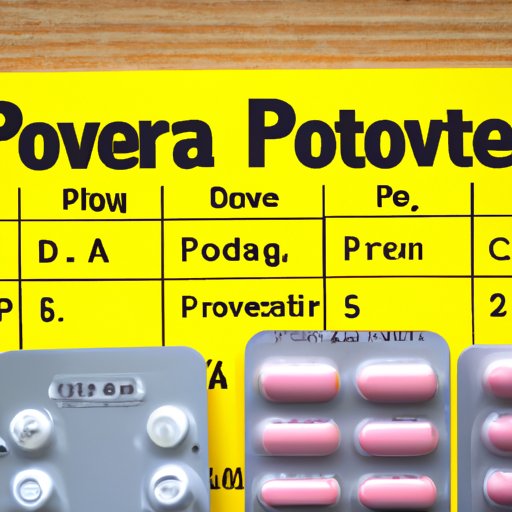Introduction
Depo Provera is a hormonal contraceptive that is injected into the body every three months. It is one of many forms of birth control available to women and is often used as an alternative to other methods such as the pill or an IUD. The purpose of this article is to explore how does Depo Provera work, examining its mechanism of action and side effects. We will also compare Depo Provera to other hormonal contraceptives, discussing their benefits and risks.
Explaining the Mechanism of Action of Depo Provera
Depo Provera contains the hormone progestin, which works in the body to prevent pregnancy. When injected, the progestin stops ovulation from occurring, meaning that no egg can be released and fertilized. The hormone also thickens the cervical mucus, which makes it difficult for sperm to travel through the cervix and reach an egg. Finally, the hormone changes the lining of the uterus, making it less hospitable for implantation of a fertilized egg.
These combined mechanisms of action make Depo Provera highly effective at preventing pregnancy. According to the Centers for Disease Control and Prevention (CDC), when used correctly, Depo Provera is over 99% effective. This means that fewer than one out of every 100 women will become pregnant while using the medication.
Examining the Risks and Benefits of Depo Provera
Like all medications, Depo Provera has potential side effects. Some common side effects include irregular menstrual bleeding, headaches, weight gain, and depression. While these side effects are usually mild and temporary, they can be uncomfortable. More severe side effects are possible but rare.
Despite the potential risks, there are many advantages to using Depo Provera. The medication is highly effective and requires no daily maintenance. It is also reversible, meaning that fertility will return once the medication is stopped. Additionally, Depo Provera does not contain estrogen, which may be beneficial for some women who cannot take hormonal contraceptives containing estrogen.

Investigating How Long Depo Provera Lasts
When used correctly, Depo Provera is effective for up to 12 weeks. This means that the injection must be repeated every three months in order for the medication to remain effective. It is important to note that the injection does not provide protection against sexually transmitted infections (STIs). Therefore, condoms should still be used to protect against STIs.

Analyzing How Depo Provera Affects Fertility
Depo Provera can have both short-term and long-term effects on fertility. In the short term, the medication may cause irregular periods and a decrease in fertility. However, most women will begin to ovulate again within six months of stopping the medication. In the long term, Depo Provera does not seem to have any lasting effects on fertility.
Describing the Side Effects of Depo Provera
Common side effects of Depo Provera include irregular menstrual bleeding, headaches, weight gain, and depression. These side effects are usually mild and temporary. However, more severe side effects are possible and can include bone loss, liver problems, and an increased risk of certain cancers. It is important to talk to your doctor if you experience any of these symptoms.

Comparing Depo Provera to Other Hormonal Contraceptives
Hormonal contraceptives come in many forms, such as pills, patches, rings, and injections. Each option has its own set of pros and cons. For example, the pill requires daily maintenance, while the patch needs to be changed weekly. Injections, like Depo Provera, require less frequent maintenance but may have more side effects. It is important to discuss your options with your doctor in order to find the best form of birth control for you.
Conclusion
Depo Provera is a hormonal contraceptive that is injected into the body every three months. It works by preventing ovulation and thickening the cervical mucus, making it difficult for sperm to reach an egg. While there are potential side effects, such as irregular menstrual bleeding and headaches, there are also many advantages, including its high effectiveness and reversibility. It is important to discuss your options with your doctor in order to find the best form of birth control for you.
(Note: Is this article not meeting your expectations? Do you have knowledge or insights to share? Unlock new opportunities and expand your reach by joining our authors team. Click Registration to join us and share your expertise with our readers.)
